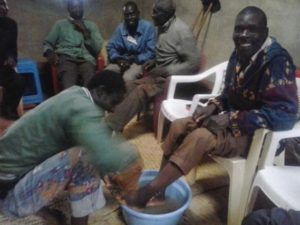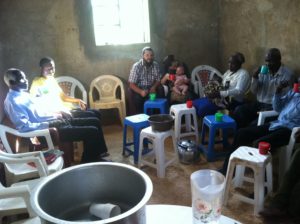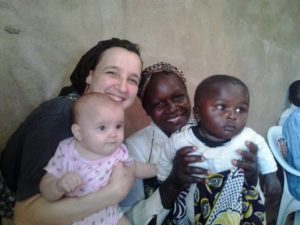Communion service is one of the most sacred and mysterious practices of the church. It is mysterious in nature because of it inexplicable power to connect the souls of the saints in one common bond of unity and love, and the ability to link Christ (the head) with the church (the body) in one fellowship and one community.
” And He took bread, and gave thanks, and broke it, and gave it to them, saying, ” This is my body which is given for you; do these in remembrance of Me.” Likewise He also took the cup after supper, saying , ” This cup is the new covenant in My blood, which is shed for you.” ( Luke 22:19-20)

Our communion here in our village fellowship usually begins with the saints washing one another’s feet in humility as a sign and symbol of service to one another, and a mark of willingness to be a servant. Men will wash men’s feet, while women will wash other women’s feet. We do this according to the instructions that the Lord Jesus gave to the church.
” So when He had washed their feet, taken His garments, and sat down again, He said to them, ” Do you know what I have done to you? You call Me Teacher and Lord, and you say well, for so I am. If I then, your Lord and Teacher, have washed your feet, you also ought to wash one another’s feet. For I have given you an example, that you should do as I have done to you. Most assuredly, I say to you, a servant is not greater than his master; nor is he who is sent greater than he who sent him. If you know these things, blessed are you if you do them.” ( John 13:12-17).
Unlike the Sunday general service, which is open fellowship, communion service is usually closed; only the baptized believers attend. Visitors who are not yet part of the spiritual family would find it very difficult to comprehend the mystery behind the sacred fellowship of breaking bread and sharing the cup of Christ. And as the apostle Paul warned, without proper examination and thorough inner listening, careless participation can result in punishment and chastisement.
“For as often as you eat this bread and drink the cup, you proclaim the Lord’s death until He comes. Therefore whoever eats the bread or drinks the cup of the Lord in unworthy manner, shall be guilty of the body and the blood of the Lord. But a man must examine himself, and in so doing he is to eat of the bread and drink of the cup.” ( 1 Corinthians 11)
In our communion services, the saints are given few minutes of introspection and inner examination in silence to find where they have erred, either by words, thoughts, or deeds. Then, there is time for sincere confession and repentance before the church. Here, there is no condemnation, no judgement, no criticism; only love, forgiveness and understanding. The elders pray for the restoration of the sinner and beseech the Lord to pardon the church for its errors and transgressions.
After confession and repentance, the church shares e a simple meal together to symbolize their unity and oneness in Christ. The meal is any meal that is available and healthy for all members. A full meal might be rice with beans, but sometimes it is just tea and bread or maandazi. As families and the community feast, these meals are always covered with great joy and gratitude of heart, and perfumed with the love of God. This is the meal of thanksgiving.

To imitate Christ is the surest way to the kingdom of Heaven. He alone knows the way to the father, and the way to life. In communion with one another, we are at one with God through Christ, our atonement.

